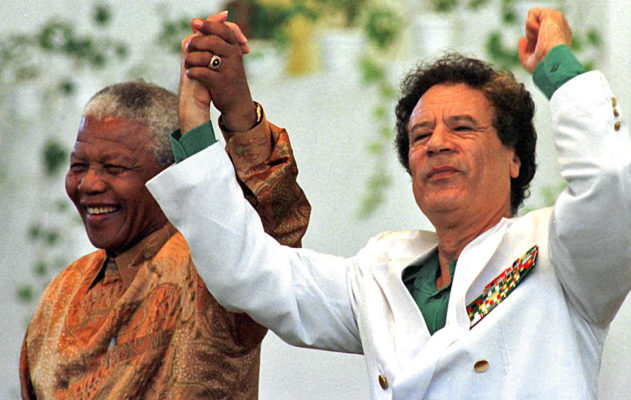From the shadowy corridors of political intrigue to the iron fists that clenched nations, we uncover the shocking realities of their rule. Brace yourself as we unravel the web of manipulation, suppression, and unchecked power that shaped the destinies of their countries.
People Also Read: Inspiring African Leaders Who Paved the Way to Greatness
Become an insider. Subscribe to our newsletter for more top trending stories like this!
1. Idi Amin (Uganda)
Idi Amin was a former military officer who seized power in a coup and ruled Uganda as the president from 1971 to 1979. Amin’s leadership was characterized by authoritarianism and brutality. He implemented oppressive policies, including human rights abuses, widespread corruption, and ethnic persecution.
Amin’s regime was marked by violence and state-sponsored terrorism, resulting in the deaths of thousands of people. He expelled Uganda’s Asian population, leading to a significant economic decline. Amin’s aggressive foreign policies strained international relations, and his erratic behavior contributed to instability within Uganda.
Eventually, his rule ended when he was overthrown in 1979. The legacy of Idi Amin remains a dark chapter in Uganda’s history, symbolizing the dangers of unchecked power and the devastating consequences of a dictatorial regime.
2. Mobutu Sese Seko (DRC)
Mobutu Sese Seko was a former military officer who seized control of the Democratic Republic of the Congo (formerly known as Zaire) and ruled as its president from 1965 to 1997. With an iron fist, Mobutu established an authoritarian regime characterized by corruption, repression, and economic mismanagement.
He consolidated power, suppressing political opposition and silencing dissent through brutal means. He also amassed personal wealth through embezzlement and corruption, while the country’s economy suffered.
Under his rule, the Congolese people experienced widespread poverty and deprivation, while Mobutu and his inner circle enjoyed lavish lifestyles. His regime became synonymous with kleptocracy and nepotism.
Eventually, Mobutu’s misrule and international pressure led to his downfall, and he was overthrown in 1997. The legacy of Mobutu Sese Seko stands as a cautionary tale of a leader who prioritized personal gain over the welfare of his country, leaving a legacy of instability and economic ruin in his wake.
People Also Read: 11 Famous African Kingdoms and Their Prominent Rulers
3. Robert Mugabe (Zimbabwe)
Robert Mugabe was a prominent political figure who served as the President of Zimbabwe from 1980 to 2017. Mugabe initially gained popularity as a liberation hero who fought against British colonial rule, leading to Zimbabwe’s independence.
However, his leadership soon became characterized by authoritarianism, economic mismanagement, and human rights abuses. Mugabe implemented controversial policies such as land redistribution, which disrupted the agricultural sector and led to economic decline.
He suppressed political opposition, curtailed freedom of speech, and manipulated elections to maintain his grip on power. Mugabe’s regime was marked by corruption and cronyism, with wealth and resources concentrated among a select few.
Despite early promises of democracy and prosperity, Zimbabwe experienced high inflation, unemployment, and poverty under his rule, which ended in 2017 when he was ousted in a military-led intervention. The legacy of Robert Mugabe is one of a promising liberation leader turned autocrat, leaving behind a divided nation grappling with the consequences of his policies and decades of misrule.
4. Omar Al-Bashir (Sudan)
Omar Al-Bashir was a former military officer and politician who held power in Sudan for nearly three decades. After coming to power in a military coup in 1989, Al-Bashir established an autocratic regime characterized by repressive measures, human rights abuses, and economic mismanagement. He ruled Sudan as the President until 2019, when he was ousted from power following a popular uprising.
Become an insider. Subscribe to our newsletter for more top trending stories like this!
During his tenure, Al-Bashir’s government faced accusations of committing war crimes, crimes against humanity, and genocide in the Darfur region. The conflict in Darfur led to widespread displacement, loss of life, and humanitarian crises. Al-Bashir was also known for suppressing political opposition, censoring the media, and restricting civil liberties. His regime was marked by corruption and the concentration of power among a small circle of loyalists.
Under Al-Bashir’s leadership, Sudan faced economic challenges, including high inflation, poverty, and limited access to basic services. The government’s mismanagement and corruption contributed to the country’s economic decline.
In April 2019, following months of protests against his rule, Al-Bashir was overthrown by the military. He was subsequently arrested and faced charges related to corruption and human rights abuses.
The legacy of Omar Al-Bashir is one of autocracy, conflict, and economic hardship. His rule left a lasting impact on Sudan, with ongoing efforts to address the consequences of his actions and rebuild the nation.
People Also Read: The Mursi Tribe of Ethiopia Dubbed the Most Dangerous African Tribe
5. Muammar Gaddafi (Libya)
Muammar Gaddafi was a Libyan political figure who ruled the country with an iron fist for over four decades. Gaddafi came to power through a military coup in 1969 and established an autocratic regime characterized by repression, human rights abuses, and erratic behavior.
During his rule, Gaddafi centralized power and suppressed political opposition, denying basic civil liberties and freedom of speech. He implemented a system known as the “Jamahiriya,” which aimed to give power to the people but effectively concentrated authority in his hands and his loyalists.
Gaddafi’s regime was marked by widespread corruption, economic mismanagement, and the marginalization of minority groups. His government utilized state-controlled media to promote his ideology and propaganda, further stifling dissent and critical voices.
Internationally, Gaddafi’s regime was often controversial. He supported various militant groups and engaged in acts of terrorism, leading to strained relations with many countries. Gaddafi was known for his flamboyant style and eccentric behavior, which often attracted attention in global media.
In 2011, amidst the Arab Spring uprisings, a revolt erupted in Libya, leading to a civil war. The conflict resulted in NATO intervention, and Gaddafi was eventually captured and killed by rebel forces in October 2011.
The legacy of Muammar Gaddafi is one of authoritarianism, human rights abuses, and political instability. His rule left a lasting impact on Libya, with ongoing challenges in rebuilding institutions and establishing stability in the aftermath of his regime.
Spotcovery offers unique and fresh daily content on Black culture, lifestyle, and experiences. We talk about everything black, black people, black-owned and black-owned businesses. We also deliver authentic and relevant content that will inform, inspire and empower you! The future of black media is a critical piece of the black experience of today! Our primary audience includes African American, African, Afro-Caribbean and people of African heritage. Black culture is for the culture!
Become an insider. Subscribe to our newsletter for more top trending stories like this!





